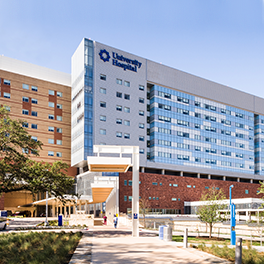You’re in Good Hands with Our Bariatric Surgeons
We understand that it’s frustrating when changing your eating habits and beginning an exercise program has not helped you lose excess pounds. When it seems like nothing else is working, you may want to discuss weight-loss surgery with your doctor.
Our board-certified bariatric surgeons offer many kinds of bariatric procedures to help our patients shed the extra weight and live healthier, happier lives. Our surgeons will work with you to find the right bariatric surgery solution for your weight management needs.
Understanding Bariatric Surgery
Bariatric surgery is a weight loss surgery that helps many people lose weight by surgically altering the gastrointestinal system. Bariatric surgeries offer many benefits, such as lowering your risk of developing chronic health conditions.
Our bariatric surgeons perform several different kinds of minimally invasive surgical weight-loss procedures to help patients reach their ideal weight.
The bariatric surgery procedures we offer include:- Sleeve gastrectomy: You may have heard of this procedure as a gastric sleeve. It is a type of stomach surgery in which a portion of the stomach is removed from the body. The remaining stomach is about the size and shape of a small banana, limiting the amount of food a patient can eat. This is the most common type of weight-loss surgery we perform.
- Gastric bypass surgery: Also called Roux-en-Y gastric bypass, this procedure involves creating a pouch out of the stomach that attaches to the small intestine. This way, food bypasses the stomach and goes directly from the pouch into the small intestine. This is a very effective form of stomach surgery for weight loss.
- SADI-S: Short for Single Anastomosis Duodeno–Ileal bypass with Sleeve gastrectomy, the SADI-S procedure is relatively new to the bariatric surgery specialization in the United States. After performing an initial sleeve gastrectomy, our bariatric surgeons follow up with an intestinal bypass, which restricts the nutrients your body can absorb from food. Daily nutritional supplements will be a permanent addition to your diet after surgery.
- Weight-loss surgery revisions: Some patients who have received older kinds of weight-loss surgery, such as a gastric band surgery or a mini bypass, experience intolerable symptoms or weight regain after the procedure. Our bariatric surgeons help these patients by performing surgical revisions to a more effective surgical weight-loss solution.
- Advanced endoscopic therapy: As complementary to surgery, our capable faculty gastroenterologists may advise one of several advanced endoscopic therapies to achieve your weight-loss goals. Few other hospital systems offer these services, but our gifted doctors make these options possible for our patients.
Accredited Excellence in Bariatric Surgery
We are proud to be a Metabolic and Bariatric Surgery Accreditation and Quality Improvement Program (MBSAQIP) Accredited Center—a designation reserved for metabolic and bariatric surgery programs that meet the highest standards for quality care, patient safety and successful outcomes.
This accreditation, a joint program of the American College of Surgeons (ACS) and the American Society for Metabolic and Bariatric Surgery (ASMBS), signifies our:
- Commitment to Safety: Our program has undergone a rigorous, independent review and has demonstrated a culture dedicated to the safest patient care possible.
- Proven Expertise: Our surgeons, nurses and entire multidisciplinary team meet stringent requirements for volume, experience and specialized training.
- Focus on Quality: We actively track and analyze our surgical outcomes, ensuring we consistently follow best practices to deliver superior, long-term results for our patients.
Choose our accredited program and partner with a dedicated team and a facility proven to deliver the highest level of care for your successful weight loss journey.
Our Bariatric Surgery Technology
Most of our surgical operations are performed laparoscopically, meaning we use tiny incisions rather than open abdominal surgery. These minimally invasive procedures speed recovery time and reduce the time our patients spend in the hospital.
When possible, we use a combination of laparoscopy and robotics—an even more advanced technology—to ensure your surgery goes as smoothly and precisely as possible.
Who Qualifies for Bariatric Surgery
While we encourage all of our patients to try to achieve a healthy weight by eating a nutritious diet and getting enough physical activity, sometimes those methods are unsuccessful at helping people lose weight. If diet and exercise have not helped you achieve your weight-loss goal, your doctor may recommend bariatric surgery.
To be a candidate for bariatric surgery, patients must have a body mass index (BMI) of 40 or greater. If you have a BMI between 35 and 40 along with another medical condition related to obesity, you may also be a candidate.
These other conditions include:- Diabetes
- High blood pressure
- High cholesterol
- Obstructive sleep apnea
You also must meet other criteria, such as not smoking. Your doctor will recommend ways to prepare for your weight loss surgery a few months in advance.






